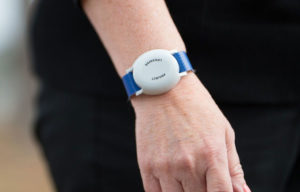
L.A. Found offers help to wandering Alzheimer’s patients
The Onslaught of Alzheimer’s
It’s staggering. At this very moment in America, 5.7 million people have Alzheimer’s disease. In just three decades, that number will be 14 million.
Today in the United States, family members and unpaid volunteers provide more than 18.4 billion hours of care to people suffering from Alzheimer’s. But that care is not easy to give. Since Alzheimer’s destroys memory and brain function, patients can become confused, angry, and aggressive. A whopping 60 percent of Alzheimer’s patients wander away from their known surroundings.
Finding the Lost
How do you find those who have wandered off? If Alzheimer’s patients no longer remember names or locations, how do you who they are or where they live when you find them?
Project Lifesaver was founded in Chesapeake, Virginia in 1999 as an answer to exactly that problem. An innovative program, the sole purpose of Project Lifesaver is to help bring the lost home.
It’s a simple idea, really. Project Lifesaver distributes watch-like wristbands that can be fastened to an Alzheimer’s patient’s wrist. If the person wanders off, the radio frequency inside the device can be turned on. Local law enforcement and senior citizens agencies then work together to locate and identify the patient.
L.A. Found
Los Angeles County, California, has adopted and expanded the original Project Lifesaver program. The new program is called L.A. Found. L.A. Found is a partnership that puts the 100,000 people already working in the law enforcement system on alert if someone is reported missing. A coordinated search begins immediately, with agencies calling hospitals, bus stations, train depots and morgues to search for a wanderer. The L.A. Found program also helps to distribute Project Lifesaver bracelets to Alzheimer, dementia and autism sufferers.
 If the person who has wandered off is wearing a Lifesaver bracelet, law enforcement can easily track the person’s location, identify them, and bring them home.
If the person who has wandered off is wearing a Lifesaver bracelet, law enforcement can easily track the person’s location, identify them, and bring them home.
Since the L.A. Found initiative began working with the Project Lifesaver bracelets, the speed of finding and recovering a “wanderer” has drastically increased. Recovery time is an important issue. Up to half of the cognitively impaired persons who wander off die or suffer serious injury if they are not found within 24 hours.
Hope on the Horizon
L.A. Found is just the beginning in helping people with Alzheimer’s, dementia or autism. Right now, the bracelets cost $325 each, but there is hope that funding can be found to provide the bracelets to the patients who can’t afford them.
There is hope that cities and counties all over the nation will adopt a similar approach to finding the lost.
There is hope that the plight of those with Alzheimer’s and those caring for them will get better.
There is hope. As the number of Alzheimer’s patients grows, so do the ways to help them.

 I Once Was Lost: Hope for Wandering Alzheimer’s Patients
I Once Was Lost: Hope for Wandering Alzheimer’s Patients


 How Dare You Die Now!
How Dare You Die Now!

 “Help Me, Helen”
“Help Me, Helen”














